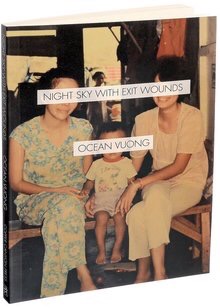
The dedication to Night Sky With Exit Wounds reads: “for my mother [& father]” and the brackets between mother and father is one of the strongest threads in the weave of this collection of poetry. Ocean (I use his first name because I feel like I know him now and I’ve already fallen in love with his author photo & it’s a beautiful name too) writes sharply about the deep unembraceable hunger for love and touch and wanting that comes with a father that hits your mother and hugs you with liquor on his breath and scares you with his weapons and his physicality. But he also has that poets eye, compassionate and cosmic, that sees his father as the survivor of a terrible war and a terrible time. Sexuality is ever present and always questioned with suspicion in these poems. Straight women worry about becoming their mother in their relationships. Straight men worry about whether they are becoming their fathers. Gay men worry about whether they are their mother who sublimates her self for a man or their father who possesses another (not all straight relationships are like this, but I don’t see the value in pretending like most are not).
Mixed race and immigrant children take the hard work of coexistence and assimilation into their bodies. The political status of your people are the winds that can blow self-esteem and security away. When I’m with white people, I say that I’m Mexican-American. When I’m with Latinos, I say nothing at all, because the real truth of it is that my home culture is neither Mexican nor American, it is the negotiated culture of my parent’s marriage.
The cover photo is of Ocean as a young boy seated between two women. On his shirt is written—I gasped out loud when I made out the faded words—”I Love Daddy.” White bars with the title and author hide their eyes, echoing documents censored by the military, but also maybe protecting the people in the photos from being completely seen. You can still make out the scared expression on the little boy’s face.
The good: a cosmic and compassionate sense of the billiard balls of history, frank and steamy erotic images, aching heart like a bruise.
The bad: I thought the collection could have trimmed a few poems and emerged stronger, some of the poems sprawled in a way that seemed messy, I thought that “Our Daily Bread” should have closed the collection.
The ugly: no ugliness, except maybe for an ugly cry.
🌟🌟🌟🌟🌟/😶✍🏼🌏🌊🌈🛠
Night Sky With Exit Wounds – Ocean Vuong

